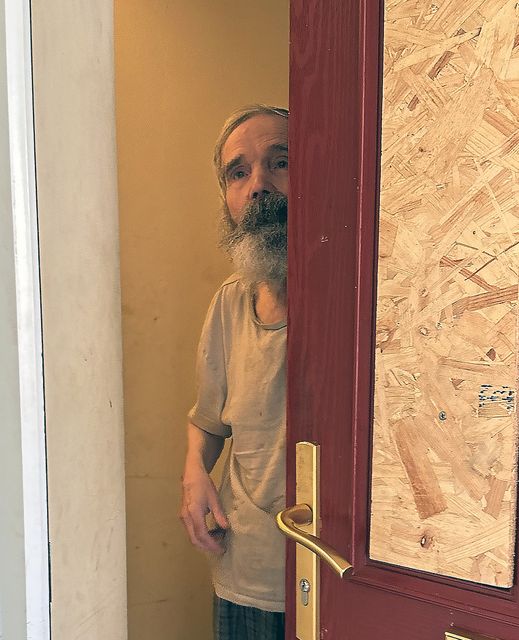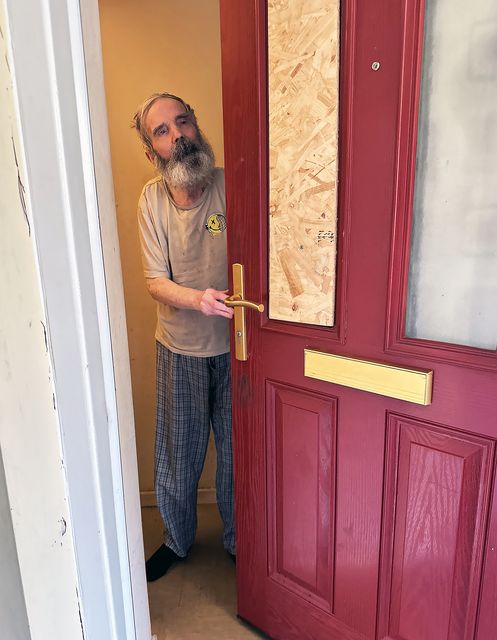A 79-year-old man who has admitted running a Belfast brothel for 13 years claims he was forced into the sex crimes.
Albert Rodgers originally denied being involved in a brothel operating from his home in north Belfast between 2009 and 2022.
However, he has changed his plea to guilty and is due to be sentenced this week.
When confronted by the Sunday World at his flat at Antrim Road on Friday, a frail Rodgers said he received a number of “beatings” from men who made him allow his home to be used by prostitutes.
He said he would be glad to “get the matter out of the way”.
Rodgers’s claims about being forced into running the brothel were also put forward in court this week by his solicitor.
During a brief adjournment hearing at Laganside court, the solicitor said they would be submitting Rodgers was “to a large extent” taken advantage of by “various individuals”.
The legal representative also said the defence would be claiming Rodgers had been “ejected from his house and beaten up” by the same people.
However, the court was also told Rodgers has a previous conviction for a “very relevant offence” in 2005.
Albert Rodgers
In relation to the latest offences, the Belfast pensioner has admitted he acted in the management or assisted in the management of a brothel between February 9, 2009, and June 8, 2022. He has also pleaded guilty to intentionally controlling three women as prostitutes on various dates between 2015 and 2022.
When he first appeared in court last year, Rodgers was charged with two co-accused, who are also both in their 70s.
According to court documents, the pair are also due to be sentenced this week.
The 74-year-old’s solicitor told this week’s court hearing his client would be “very keen” to attend the sentencing hearing remotely from prison because of health issues.
This request was allowed by the judge.
The case against the three men is a major boost for the PSNI in the fight against prostitution in Northern Ireland.
However, a charity has raised concern that legislation in Northern Ireland to combat prostitution is not being used enough to secure convictions.
The Human Trafficking and Exploitation Act 2015 introduced the so-called “Nordic model”, which criminalised paying for sexual services.
It now means anyone convicted of the offence could face up to a year in prison and a fine of £1,000.
However, the charity Christian Action, Research and Education (CARE) recently claimed a “soft touch” approach was being taken to enforcing the new law in Northern Ireland.
Tim Cairns, CARE’s policy lead on commercial sexual exploitation, was speaking in August after a 70-year-old Belfast man was given a conditional discharge after being convicted with three counts of paying for sexual services, and four counts of attempting to do so.
The charity claimed he was only the second person to be convicted under the sex buyer law since 2018.
“With countries across the world now adopting the Nordic model to protect vulnerable victims of human trafficking, it is alarming that the PSNI and the courts in Northern Ireland have not done so properly,” claimed Mr Cairns.
“Their failure to secure convictions ensures that demand for sexual exploitation continues. This is good news for criminals, and bad news for those they exploit.
“Northern Ireland’s sex laws, introduced in 2015, were pioneering, with the rest of Ireland implementing similar legislation in 2017.
“The island of Ireland should be leading the way in ensuring that those who profit from the sale of sex are targeted and successfully convicted.
“It is shameful that police on both sides of the border have not taken these obligations seriously enough.
“Freedom of information data obtained by CARE shows that men who visit brothels and aid crime receive cautions or community resolutions.
“This ‘soft touch’ approach is helping criminal gangs.
“Police and prosecutors must explain why purchase of sex laws are not being enforced. In other countries, purchase of sex convictions are obtained through routine evidence-gathering techniques.
“Convictions in Sweden rose steadily as the country’s law was embedded, from 10 in its first year of operation, to 326 in its eleventh year.
“If the PSNI and DPP (Director of Public Prosecutions) are serious about ending exploitation, they must enforce the law.”
Albert Rodgers answers the door to us during the week
However, speaking in August after a major operation against the trafficking of women for sexual exploitation saw four people arrested, PSNI Detective Inspector Rachel Miskelly said such crimes were a key priority for police.
She appealed for anyone who may have information about potential exploitation cases to come forward.
“We will continue to do everything in our power to tackle human trafficking for sexual exploitation, but we need your support,” she said.
“This very real issue could be happening in your street or neighbourhood.
“And I am appealing to you, if you have any information or concerns that someone is being exploited or controlled, to please contact us.
“Likewise, if you are, or have been, a victim please speak to us. We have a dedicated team who want to help you, and I promise you will be treated with the utmost respect and sensitivity.
“In an emergency call 999; 101 in a non-emergency; or call the Modern Slavery Helpline on 0800 012 1700.”

